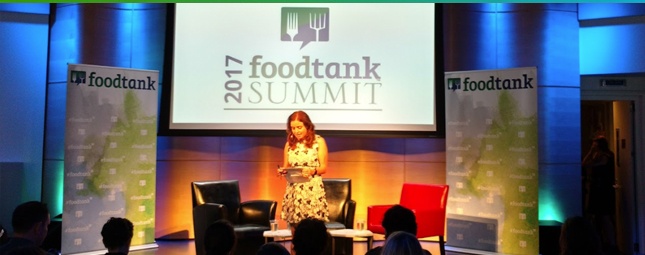3 Take-Aways from Food Tank NYC

Last week LeanPath participated in Food Tank’s NYC Summit on Preventing Food Loss and Food Waste. Coming on the heels of July’s Food Waste Fair in Brooklyn, we are excited to see growing momentum behind food waste reduction in the Big Apple.
The Summit brought together a diverse group of innovators and thinkers from multiple sectors – culinary, non-profits, NGO’s, government, and business. Five key panel discussions were held, focusing on developing partnerships, addressing opportunities, financing, fighting food waste in cities, and creating a waste and loss-free world. Woven throughout these discussions were critical themes of awareness, education, behavior change, design, innovation, financing, regulation, recovery, circular economy, and solutions.
One thing was clear: All of the participants were clearly united around the common objective of driving food waste prevention forward.
The positive vibe and high energy level emanating from working on such an important challenge never waned throughout the day’s packed schedule, and three clear takeaways emerged:
1. Awareness and Valuation are still lacking.
The event began in earnest with a “fireside chat” between former US Secretary of Agriculture Tom Vilsack and chef Tom Colicchio, where the stage was set for the day on key themes of awareness and valuation. Colicchio noted that despite all of the efforts of the people in the room, he feels the average person on the street doesn’t understand the food waste issue – and that the more we get it “out there” the more likely we will be to find solutions. Vilsack cited a recent talk at Colorado State where he encouraged young people to “do what young people have always done” in the past on important issues by getting educated and advocating for change on food waste. The conversation then swung to value, with Colicchio describing Depression-era values that have been lost, noting that we simply no longer value food. Vilsack concurred, first drawing a parallel to water, and noting that we lack sufficient respect for food and for the extraordinary effort that went into producing it. That mindset needs to change.
2. Prevention is the ultimate win.
In the partnerships session, Pete Pearson of World Wildlife Fund (WWF) made the link between food waste and wildlife, noting that food production is the primary driver of biodiversity loss. He questioned why we continue to expand the agricultural footprint when we currently produce enough food to feed the world (but waste so much). Pearson also noted that “we don’t grow food to compost it” and since aren’t able to recycle our way out of the food waste problem, we’d better get back to properly valuing food. In other words, we’re all much better served if we prevent food waste from occurring in the first place.
3. What you measure, you manage (and measurement matters!).
Jude Medeiros, Regional VP of Schools for Sodexo, discussed Sodexo’s partnership with LeanPath to track and measure food waste in their school cafeterias. Medeiros noted how the LeanPath tracker meets Sodexo’s data-driven needs, allowing the organization to reduce costs and increase operational efficiency. Tracking their food waste has not only enabled Sodexo to make significant strides in production optimization, but it has allowed the organization to demonstrate additional value to its clients. Further, Medeiros discussed the benefit of the LeanPath partnership from an employee engagement standpoint, noting that employees love the food waste reduction work and the training that they receive as it empowers them to be change-makers.
Awareness. Prevention. Measurement. All critical themes in changing our food system, and all revolve around Valuation.
Along with many other developed countries, we’ve lost touch with the value of our food resources, and the result is an excessive amount of waste globally (over one billion tons). Such profligate waste carries extensive financial costs, threatens our environment, reinforces inequity, and represents a missed opportunity to improve health. It’s not only morally wrong, it’s simply unsustainable.
At LeanPath, we realize that nothing connects humanity more than food.
We’re in the food waste space for the love of food. And we’re laser-focused on the top tier of the food waste hierarchy, prevention (or source reduction), because we’ve long recognized that it is the most impactful place to be. Preventing the waste of food saves much more than the food itself; it saves all of the resource inputs (seed, fertilizer, water, pesticides, labor, fuel, etc.) involved in producing those fruits, vegetables, and meat products and bringing them to market.
Our vision is to end avoidable food waste, and our mission is to make food waste prevention easy. We achieve this through our integrated hardware, software, and people empowerment programs, which make it easy for frontline culinary workers to track and measure food waste; because we believe that what you measure, you manage. We also see food waste as a behavioral problem, and we see those frontline workers as the key leaders of change for food waste prevention. We continue to innovate, not only in pre-consumer food waste, but also in the post-consumer side with products like Spark, our digital signage product that aims to change consumer behaviors. Because at LeanPath, we firmly believe in the value of food, and in-line with the Food Tank Summit’s theme, we’re dedicated to preventing food loss and waste.
